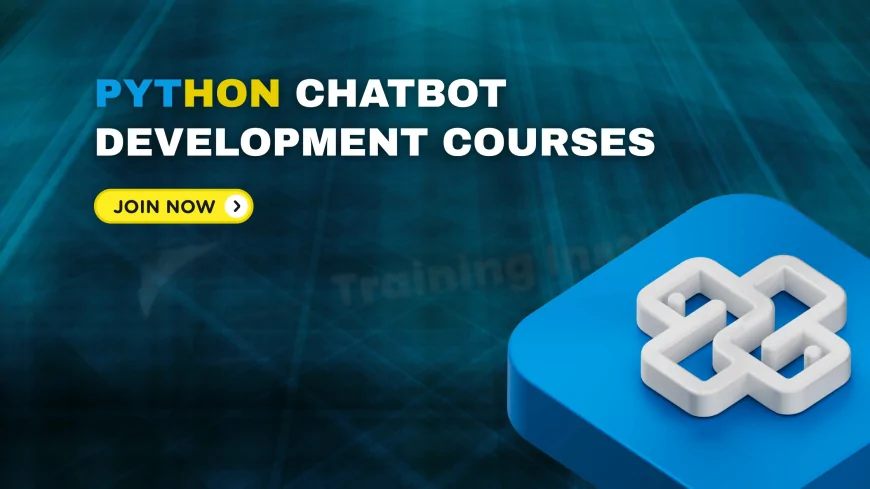Python Chatbot Development Courses Pune | Top Pune Institutes for AI Chatbot Training with Python
Enroll in top-rated Python Chatbot Development Courses in Pune. Learn NLP, AI, and real-time chatbot building using Python with hands-on projects and placement support. Ideal for beginners, professionals, and freelancers aiming for high-growth AI careers.

Table of Contents
- Introduction
- Why Learn Chatbot Development?
- Core Technologies & Frameworks
- Top Pune Chatbot Courses
- Course Formats & Structure
- Sample Real‑World Projects
- Mentorship & Placement
- Career & Salary Outlook
- Selecting the Right Course
- Frequently Asked Questions
- Conclusion
Introduction
Chatbots are becoming integral to modern digital experiences—handling customer support, booking systems, FAQs, and virtual assistant roles. Python provides a powerful ecosystem, combining NLP libraries, AI services (OpenAI, Rasa, Dialogflow), and deployment platforms. In Pune, several institutes and training partners offer structured chatbot development courses. These range from weekend workshops to month‑long intensive bootcamps with project-based outcomes and placement support.
Why Learn Chatbot Development?
1. Explosive Demand in Businesses
-
From banks to e-commerce to healthcare, companies are integrating chatbots to automate customer service, bookings, and FAQs.
-
Pune-based startups and enterprises are increasingly using chatbots to reduce manual support and enhance user experience.
2. Python is the Perfect Chatbot Language
-
Python offers powerful libraries like NLTK, spaCy, Rasa, ChatterBot, and TensorFlow, making chatbot building easier and faster.
-
It supports API integrations, machine learning, and natural language processing (NLP)—core to chatbot intelligence.
3. Great for Career Growth
-
Roles like Conversational AI Developer, NLP Engineer, or Chatbot Product Designer are high-paying and globally relevant.
-
Mastering chatbot development makes you job-ready for sectors like fintech, edtech, and SaaS platforms.
4. Ideal for Freelancers & Entrepreneurs
-
Many small businesses need custom chatbots for WhatsApp, websites, and mobile apps.
-
Developers can offer chatbot-as-a-service and earn via freelance gigs or productized tools.
5. Enhances Core Skills
-
You learn about user interaction design, data handling, API integrations, and logic building—skills that are transferable across many domains.
-
Working with platforms like Dialogflow, Rasa, and GPT-based APIs broadens your technical exposure.
6. Build Real Applications
-
You don’t just write code—you build working bots that reply, guide, and solve real user problems.
-
Sample bots: Customer support bot, Job recommendation bot, Language learning assistant, Event booking assistant.
7. Excellent Resume Booster
-
Chatbots are a hot topic in AI portfolios. Showcasing your own working chatbot can impress recruiters.
-
Courses in Pune even help with GitHub portfolios, resume reviews, and mock interviews.
8. Future of AI Interaction
- With advancements in voice bots, multilingual NLP, and Generative AI (ChatGPT), chatbot developers are at the heart of conversational AI innovation.
Chatbot training is a strong stepping stone toward advanced AI/ML careers.
Core Technologies & Frameworks
- Rasa: Open-source conversational AI with NLU, dialogue management, and custom actions :contentReference[oaicite:1]{index=1}.
- Dialogflow / Google Cloud: NLP-based intent/slot handling plus integrations.
- IBM Watson Assistant: AI‑driven chatbot service with visual flow builder :contentReference[oaicite:2]{index=2}.
- Microsoft Bot Framework + Azure: Conversational AI with QnA Maker & Cognitive Services.
- OpenAI GPT‑based bots: ChatGPT-style applications with language models.
- Core Python libraries: spaCy, NLTK, scikit-learn, Flask/FastAPI deployment.
Top Pune Chatbot Courses
Webasha Technologies
- Python Chatbot Development training using NLTK, Dialogflow, and Flask
- Live project: Deploy a chatbot to Telegram or website using API integrations
- 100% job assistance and GitHub-based project evaluations
- experience in chatbot programming using Python and AI libraries, along with deployment strategies for real-world use cases. Whether you're aiming for a tech startup, customer support automation role, or freelance chatbot projects, these programs help build job-ready skills in Pune’s booming AI ecosystem.
Course Formats & Structure
Python chatbot development courses in Pune are structured to accommodate both beginners and experienced developers. Institutes offer flexible learning modes, practical curriculum, and real-time project exposure. Below is a breakdown of how these courses are typically delivered:
Course Delivery Modes
- Classroom Training: On-site sessions at Pune centers with live demonstrations and hands-on coding labs.
- Live Online Classes: Interactive virtual training with real-time support and remote lab access.
- Hybrid Format: Combines recorded video lessons with scheduled live doubt-clearing sessions and mentor feedback.
- Weekend Batches: Designed for working professionals—held on Saturdays and Sundays across 6–8 weekends.
- Fast-Track Bootcamps: Intensive learning schedule (daily 2–3 hours) completed within 3–4 weeks.
Course Structure Overview
- Introduction to Chatbots
- What are chatbots and virtual assistants
- Types of chatbots: rule-based vs AI-based
- Python for Chatbots
- Python basics and libraries (NLTK, spaCy, Flask)
- APIs and webhook fundamentals
- NLP & Intent Recognition
- Entity recognition, tokenization, and language modeling
- Integrating NLP with Python for chatbot intelligence
- Bot Frameworks & Tools
- Dialogflow, IBM Watson Assistant, Rasa
- Telegram, Facebook Messenger & WhatsApp bot deployment
- Live Projects & Hosting
- End-to-end chatbot creation
- Deployment on cloud platforms like Heroku, AWS, or Firebase
- Career Support & Assessment
- Mock interviews, GitHub project uploads, and resume sessions
- Certification and placement assistance
This structured approach ensures learners understand not only the technical side of chatbot development, but also how to build deployable, real-world solutions that meet business needs.
Sample Real‑World Projects
- FAQ bot using Watson—intent classification, context walking, analytics dashboard.
- Rasa Helpdesk assistant with custom actions, slot filling and webhook integration.
- ChatGPT-powered summarizer via OpenAI API and Flask-based web interface.
- Multilingual bot using spaCy and transformer models in Marathi/Hindi
Mentorship & Placement
- Hands-on instructors: Trainers from MNCs with Python/NLP background :contentReference[oaicite:7]{index=7}.
- Resume & portfolio guidance: LearnWell includes resume tuning and interview scripts assistance.
- Cloud deployment: Bot deployments on Heroku/Azure/AWS.
- Placement tie-up: Some institutes offer job assistance via internal portals and alumni networks.
Career & Salary Outlook
- Python chatbot developer: ₹4–7 LPA for entry roles in Pune’s IT and service firms.
- NLP engineer: ₹6–12 LPA with specialized skills in dialogue design and model fine-tuning.
- Conversational AI specialist: ₹8–15 LPA with cross-functional roles involving UX and backend.
- Freelancer/Consultant: Chatbot projects often commissioned by SMEs and local businesses.
Selecting the Right Course
- Ask which bot‑framework is used (e.g., Watson vs Rasa vs ChatGPT API).
- Check project count—ideally 2+ real-world chatbot builds.
- Verify trainers’ experience and code review quality.
- Look for deployment & UX integration modules.
- Placement/community support: demos, GitHub, alumni feedback.
Frequently Asked Questions
1. Do I need NLP background?
No—courses start from basics like tokenization and intent detection.
2. How long to build a chatbot?
Approximately 20–40 hours to build and deploy a basic functional bot.
3. Is Rasa better than ChatGPT?
Rasa is open-source and controllable; ChatGPT is powerful but cloud‑dependent and costs involved.
4. Will I learn deployment?
Yes—most cover deployment using Flask on Heroku or AWS.
5. Do courses include voice bots?
Some advanced programs add Twilio or Dialogflow-based voice integration.
6. Are these online or offline?
Both—hybrid models combine weekend classroom sessions with live virtual labs.
7. What skills are needed?
Basic Python and familiarity with JSON/APIs are recommended.
8. Do I get a certificate?
Yes—completion certificates are common; some also prep for vendor certifications.
9. Are placements assured?
Some include placement support, but job guarantees are rare—your performance matters.
10. Can non-IT students join?
Yes—programs are designed for beginners to AI professionals.
11. Will I learn UI design?
Basic chatbot UI via templates or simple frontend interfaces are covered.
12. Are tools included?
Yes—include spaCy, NLTK, Rasa SDK, Watson Assistant tools.
13. Is support available after course?
Some offer mentorship or Slack groups for post-course queries.
14. Costs range?
From ₹10k (crash workshops) to ₹50k+ for intensive hybrid courses.
15. Can I freelance?
Yes—chatbots are in demand for SMEs, e-commerce, education, and customer service sectors.
16. Will Marathi bots be covered?
Advanced courses may cover multilingual options, though not always included.
17. How can I verify quality?
Ask for sample bots, GitHub repositories, and trainer LinkedIn profiles.
18. Do I need GPU?
No—most chatbots run on CPU; cloud options handle heavier ML models.
19. What next post-course?
You could pursue advanced AI, join hackathons, or freelance bot-building.
20. Will I build group projects?
Yes—many include peer coding, code reviews, and collaborative bots.
Conclusion
Pune offers a range of Python chatbot development courses—from platform-centric (IBM Watson) to open-source stacks (Rasa) and modern Gen AI models (ChatGPT). These programs emphasize experiential learning through labs, real builds, deployment, and interface design. Choosing the right one depends on your goal: enterprise chatbot roles, freelance projects, or AI integration. With practical training, mentorship, and networking, these courses can position you strongly in Pune's growing conversational AI tech landscape.
What's Your Reaction?
 Like
0
Like
0
 Dislike
0
Dislike
0
 Love
0
Love
0
 Funny
0
Funny
0
 Angry
0
Angry
0
 Sad
0
Sad
0
 Wow
0
Wow
0














